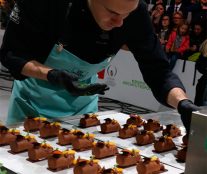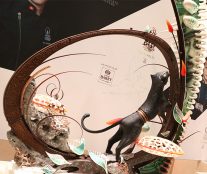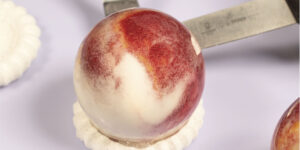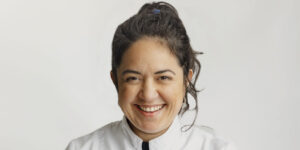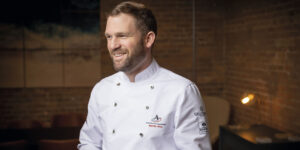Categories Pastry Chef Articles
Elias Läderach, World Chocolate Masters 2018, the story of a champion
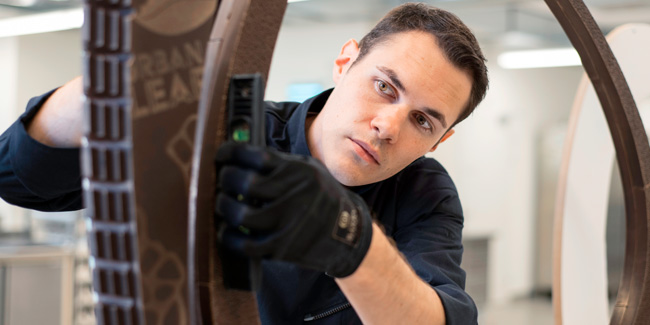
Proclaimed the new World Chocolate Masters after beating another 20 finalists in the final held in Paris last fall, Elias Läderach has demonstrated extraordinary technique in the making of artistic chocolate pieces and a refined and conscious style in the realization of both bonbons and chocolate bars as well as in making pastry creations. But what else is behind this Swiss chef? How did he prepare to become the champion? What obstacles did he have during the three days of competition and how was he able to overcome them? When we take a look at his performance more closely, we realize how important the preparation work is with a strong team, in which the influence of the chocolatier Stéphane Treand, as well as the ability to improvise and adapt to the setbacks in each of the competition, are especially highlighted. Elias Läderach himself explains that his time at the WCM was anything but a bed of roses. In particular he had two crucial moments with his chocolate art piece and with the “Fresh Pastry of the Day” of the last day of the championship. His ability to respond well to these difficulties also partly explains his victory and even the slight advantage he achieved in comparison with the second and third place finishers.
One, two, three, four … up to five special prizes were awarded to Elias Läderach in his time at the World Chocolate Masters, which shows how right those who, as the competition progressed, placed him as a clear favorite for victory were, a position disputed only at some point with clarity by the French chef Yoann Laval. Coming from an important chocolate family in Switzerland, with dozens of stores that carry his last name scattered around his area of influence in the center of Europe, Elias has shown that he not only perfectly masters the art that leads to a perfect tasting of chocolate, but in both the artistic and the competitive aspects, he has been able to perfectly know what needs to be done to win a competition of this magnitude. Here is Elias explaining it to us in his own words.
“The jury likes if they see that someone does not give up”
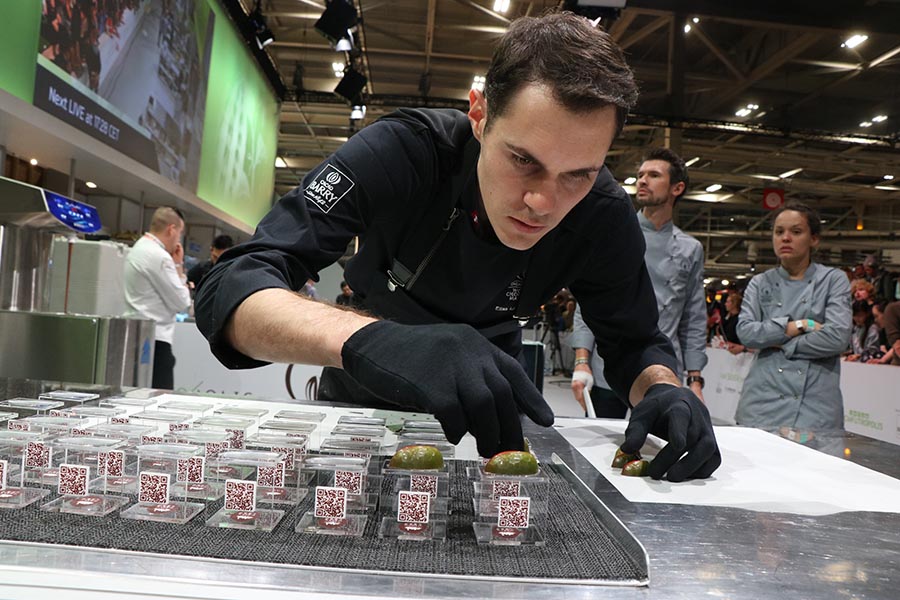
It’s been a few days since your victory, how do you feel right now?
Slowly but truly, I’m starting to realize what actually happened in Paris. And it is still an amazing feeling for me. Because I always dreamed of the goal of taking part in this competition, but I didn’t think that I could come so far, that I could stand at the top in the end. For me, it’s the most prestigious competition and of the highest level and very chocolate-centered. So that’s why, for me, it is still amazing what I could achieve in Paris.
What does this achievement mean to you and your career? Do you have something in mind to change in your future or in your chocolate business because of this victory?
For me and business-wise, it will provide more opportunities as well as growth. Right now we are looking to get in the US and other export markets. I’m sure that this will open doors for us, because not everyone can come and say, “I’m a World Chocolate Master” and I’m sure, quite confident, that it will help. And then personally it will definitely help with opportunities to go to Asia, to give classes and stuff like that. So definitely it will be an interesting time ahead of me.
It seems that everything went excellent in terms of your work and showpieces in the competition, even some apparent mistake turned into an innovative presentation and concept (fresh pastry). Do you feel lucky?
Yes, during the competition, on day one, I had some trouble with the time and the showpiece. I thought I still had an hour and a half for the showpiece, but they then told me it was only 45 minutes and time was up. I had some trouble with time but luckily it worked out in the end. On day two, I was very happy because it went like my trainings at home, everything went so well, even better than on my trainings, very smooth. On the third day, the fresh pastry, the pâte choux I baked in the pipe, didn’t come out nicely, as it should have been. But in the competition, you just have to carry on and try to make the best out of it. And I’m very happy that in the end it didn’t cost me too many points and I was able to still win first place.
In the competition, you just have to carry on and try to make the best out of it.
What did you exactly do once you realized you had less time than you expected (45 minutes)? Did you simplify your showpiece?
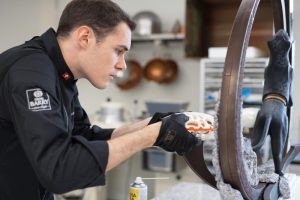 I just started speeding up like crazy. When I realized that I had a time issue, I got a cold rush and I just thought that I had worked on this competition for almost 2 years, so I can’t just mess it up now. I think I never put a showpiece together that fast. And I am very thankful that everything worked out fine. If I had more time, I would probably have put some additional little parts on it. Or place some of them slightly differently. But in the end you just have to make a plan in order to deliver the best result in that situation.
I just started speeding up like crazy. When I realized that I had a time issue, I got a cold rush and I just thought that I had worked on this competition for almost 2 years, so I can’t just mess it up now. I think I never put a showpiece together that fast. And I am very thankful that everything worked out fine. If I had more time, I would probably have put some additional little parts on it. Or place some of them slightly differently. But in the end you just have to make a plan in order to deliver the best result in that situation.
What did you explain to the jury on the final day when your pâte choux seemed to not have the perfect shape you had planned? Do you think that many members of the jury actually liked it with this original presentation?
The pâte à choux was definitely not my strongest performance. I still don’t know why it didn’t rise properly in the oven. So in the end I just tried to make the best out of it and lose as little points as possible in this task. I think the jury likes it if they see that someone doesn’t give up and that I stood behind the product that I presented, even though it wasn’t as planned. In addition, I tried to work as clean and focused as possible during the whole competition. I believe that with the way you work and the attitude you have, you can gain a certain goodwill from the jury. That helps you later on if some output is not 100% as it should be.
The showpiece award was one of my goals. I could understand not winning the competition, but I really wanted to win the showpiece award
What was your approach to the “Futropolis” theme? What messages did you try to transmit with all your buffet of creations? What concepts were behind it?
In the beginning, when I heard the theme, I really liked it. To me it’s something you can work on, architecture, nature, it was very interesting for me. I got inspired by my logo/brand and used an open leaf, it’s all about the symbiosis of nature and architecture. So, that was the creation, how can nature and humankind and future cities coexist side by side. The symbiosis among these things was very important.
What do you feel most proud of from all the products and showpieces you made?
The showpiece award was one of my goals. I could understand not winning the competition, but I really wanted to win the showpiece award, that would have been enough for me. The showpiece was always my baby and also the chocolate design, because I really like the artistic part of the competition. So that was for me the most precious assignment and award that I could get.
This competition is a little about innovation, but at the same time, you have to be wise not to take too many risks in your work. How do you find the balance?
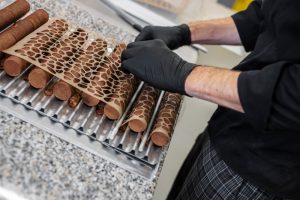 That’s something very important. You always have to keep in mind that you have 20 jury members from all over the world. If you make a recipe it must be eatable or it must be nice for the Japanese Juror, and also for the Moroccan juror and the Mexican juror. So you must be wise, and first of all it has to be the taste, it must taste incredibly good, and then you can try to twist it a little bit, to put some super fooding here and there, or try to make it less sweet, or make it vegetarian, make it a little modern, but you have to get the 20 jury members to taste it and really like it.
That’s something very important. You always have to keep in mind that you have 20 jury members from all over the world. If you make a recipe it must be eatable or it must be nice for the Japanese Juror, and also for the Moroccan juror and the Mexican juror. So you must be wise, and first of all it has to be the taste, it must taste incredibly good, and then you can try to twist it a little bit, to put some super fooding here and there, or try to make it less sweet, or make it vegetarian, make it a little modern, but you have to get the 20 jury members to taste it and really like it.
If you make a recipe it must be eatable or it must be nice for the Japanese Juror, and also for the Moroccan juror and the Mexican juror. So you must be wise and first of all it has to be the taste
What are the most intense memories from those three days of competition?
I don’t know… the three days were very intense. I am constantly very nervous before a competition. So you really try to keep calm somehow and you start the competition and then you’re just on the ground, you’re just in the “zone”, and you just go for it, and obviously you have… for instance, in the first day when you realize that you don’t have enough time for the showpiece, you get scared and then you have these cold rushes. These are moments you don’t forget very quickly. But obviously the whole ceremony at the end, all the cheering of the team and everything, are quite strong emotions and I will keep them in my mind for sure.
Will it be possible to try your wcm creations somewhere from now on?
We are trying to make a wcm collection, and we are trying to sell it in our shops with our products. Obviously we are more about the chocolate products than pastries. So we are planning on doing a collection for next year, maybe on February we will be ready for that.
How can a competition like this help the chocolate trade to evolve?
In my opinion, it is a real privilege to have a competition like that for the whole chocolate trade because it doesn’t help just the people who compete there, especially me that I could win, but it helps the whole chocolate trade, it really lifts up the image of chocolate, the love of chocolate, the passion and everything that comes along. So it is definitely very helpful for the chocolate trade.
The key and the most important thing is that you must have a strong team behind you. I believe, if you really want to go to the top, you can’t do it alone anymore
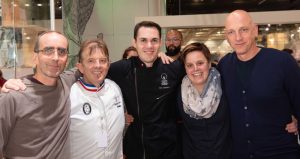 Can you give some advice to any chefs who are aiming to participate in the WCM? What do you have to do to win?
Can you give some advice to any chefs who are aiming to participate in the WCM? What do you have to do to win?
For me, the key and the most important thing is that you have a strong team behind you. I believe that this competition has become bigger over time, the competition takes place and the level is higher and higher, and I believe, if you really want to go to the top, you can’t do it alone anymore. Because obviously at the end it is one person that stands at the front and has to do the work, but then I have a lot of people helping me. We worked together, we discussed methods, and also it worked out fine. So this is the most important thing.
We know you had been training with Stéphane Treand. How did you organize your training? What is the most important thing that chef Stéphane gave you in order to perfect your work in the competition?
We were a core team of four people. Everyone had their specific areas they were strong at. If you start planning a competition, it is vital that you are very honest with yourself concerning what you are good at and where you need support. Then you look for the right people to help and complement you. Speaking of Stéphane, he is an amazing person and a great professional and artist. He helped me a lot with his huge experience and artistic skills.
One great advice from him was to preferably make something simpler but perfectly executed than do something in some crazy shape or flavor that you won’t be able execute in a proper way.
What other chocolate signature creations do you recommend we try in your chocolate shop?
We sell fresh chocolates in our shops. You can choose which ones you like, these fresh chocolates, that is also very trendy. It is really easy to understand, it is tasty. They are fresh, high quality products. It is also what I tried to do in my products in the competition, easy to understand but incredibly tasty, incredibly nice, so come to our shops and try our fresh chocolates and I’m sure you’re going to like it.
